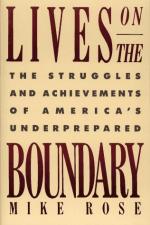
|
| Name: _________________________ | Period: ___________________ |
This test consists of 15 multiple choice questions and 5 short answer questions.
Multiple Choice Questions
1. According to Mike, what type of assessment of students was more legitimate?
(a) Worldwide.
(b) Federal.
(c) Local.
(d) State.
2. Who did Mike say was a special kind of student?
(a) Jon Stevens.
(b) Jerry Williams.
(c) Alex Hutchinson.
(d) Jack Cheney.
3. What building on the UCLA campus housed the Tutorial Center?
(a) Johnson Hall.
(b) Tudor Hall.
(c) Campbell Hall.
(d) Edwardian Hall.
4. What did Mike say new college students had limited exposure to?
(a) Large groups of people.
(b) A good grasp of grammar.
(c) Certain kinds of reading and writing.
(d) Strong study skills.
5. According to Mike what was a nickname for remedial sections in the 1930s?
(a) Sick sections.
(b) Remedial sections.
(c) Counteractive sections.
(d) Average sections.
6. What did Mike say Aphasia was?
(a) An impairment in the ability to use symbols.
(b) A psychological impairment.
(c) An educational defect.
(d) An inability to use the left side of the brain.
7. What skill did Mike believe was critical?
(a) Thinking.
(b) Summarizing.
(c) Good writing skills.
(d) An ability to discuss the past.
8. Who wrote that "Teaching bears a resemblance to the practice of medicine"?
(a) Albert Lang.
(b) Jerry Lang.
(c) Steve Lang.
(d) Paul Lang.
9. What did Mike buy to read as a child?
(a) Newspapers.
(b) Comics.
(c) Tabloids.
(d) Shakespeare.
10. What word did Mike use referring to the lively UCLA building where he worked?
(a) Excited.
(b) Happy.
(c) Interesting.
(d) Vibrancy.
11. What kind of student were most of the veterans considered to be?
(a) High average.
(b) Dedicated.
(c) Remedial.
(d) Overachievers.
12. What type of curriculum did Mike say was the used by one teacher in his new job?
(a) Focused.
(b) Independent.
(c) Difficult.
(d) Maverick.
13. Who said that students "had been hurt about their intelligence"?
(a) Rose.
(b) Lillian.
(c) Maslow.
(d) Jones.
14. When Mike was thirteen, what did he listen to with unease?
(a) Classical music.
(b) Public radio.
(c) Jazz music.
(d) Contemporary music.
15. What did Mike suggest Suzette use to avoid repetition in her writing?
(a) A different approach.
(b) A grammar checker.
(c) The tutor center.
(d) Syntactic Maneuvers.
Short Answer Questions
1. According to Mike how did educators in the 1930s view literary problems?
2. What did Jon tell Mike that he wanted to be?
3. Who said "It is what we are excited about that educates us"?
4. How did Jerry Williams act with the other veterans?
5. What rank was Andrea in her high school class?
|
This section contains 397 words (approx. 2 pages at 300 words per page) |

|




